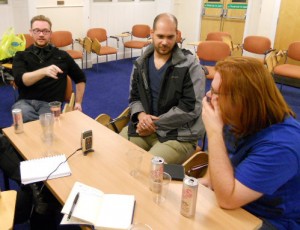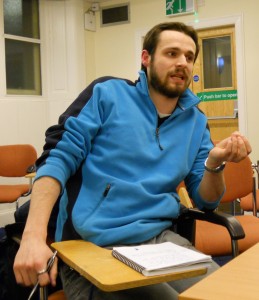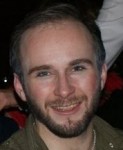
After this week’s podcast, which involved eight scholars giving their views on the future of Religious Studies, there was really only one way we could create a suitably collective and varied response – six postgrads sitting around a table, accompanied by pink gin and our trusty dictaphone. Conversation ranges from the public perception of what Religious Studies does, what to do with a RS degree, to the financial practicalities of doing postgraduate research in the UK and US today. Mostly, though, it’s a collective rant about the cognitive study of religion (for a more educated discussion on cognitive approaches to the study of religion, see our interview with Armin Geertz)..
**Regular visitors please note – we have moved our weekly feature articles to Wednesdays instead of Fridays. This will continue until further notice, and is intended to promote more discussion**
If you are new to the podcast – this is not what we usually do. If you are a regular listener – you might enjoy this, or you might not; either way, we are back to normal with Bettina Schmidt’s interview on Anthropological Approaches on Monday.
The bleeping noises are Chris’s camera, and the clunks are Liam’s can of Gin. We hope you enjoy it, we certainly enjoyed recording it. We’ll be recording another at the SOCREL (Sociology of Religion) Annual Conference in just a few days time (with a more diverse range of participants!). If you’d like this to become a regular feature, please let us know.
Choice quotations:

“I think of Religious Studies less as a discipline and more as the name of a department.”

The Discussants:
Editor’s Note: The author bios below have been left as they were first published in 2012.
Christopher R. Cotter recently completed his MSc by Research in Religious Studies at the University of Edinburgh, on the topic ‘Toward a Typology of Nonreligion: A Qualitative Analysis of Everyday Narratives of Scottish University Students’. He is currently taking a year out from study to pursue PhD applications, present at conferences, and work on projects such as this. His future research will continue to expand the theme of ‘non-religion’ to apply to ‘everyone’ in religiously diverse, socio-economically deprived urban environments, simultaneously deconstructing the religion-nonreligion dichotomy in the process. He is Deputy Editor and Bibliography Manager at the Nonreligion and Secularity Research Network, and currently editing the volume ‘Social Identities between the Sacred and the Secular’ with Abby Day and Giselle Vincett (Ashgate, 2013). See his personal blog, or academia.edu page for a full CV.
Ethan Quillen, Circular Academia: Navigating the Dangerous Waters of Term Re-Assignment for the Religious Studies Project.
David G. Robertson is a Ph.D. candidate in the Religious Studies department of the University of Edinburgh. His research examines how UFO narratives became the bridge by which ideas crossed between the conspiracist and New Age milieus in the post-Cold War period. More broadly, his work concerns contemporary alternative spiritualities, and their relationship with popular culture. Forthcoming publications: “Making the Donkey Visible: Discordianism in the Works of Robert Anton Wilson” in C. Cusack & A. Norman (Eds.), Brill Handbook of New Religions and Cultural Production. Leiden: Brill (2012) “(Always) Living in the End Times: The “rolling prophecy” of the conspracist milieu” in When Prophecy Persists. London: INFORM/Ashgate (2012). For a full CV and his MSc thesis on contemporary gnosticism, see his Academia page or personal blog.
Liam Sutherland is a Religious Studies Postgraduate student at Edinburgh University undertaking a Masters by Research, on the relevance of E.B Tylor for the contemporary theory of religion, defining religion and modern scholars with a ‘Neo-Tylorian’ influence or affinity. He is a native of Edinburgh where he also completed his undergraduate degree in 2009, producing a dissertation on contemporary Indigenous Australian spirituality and the politics of land rights. Though he began in Politics, and took many Politics and school of Social Science courses, he quickly fell in love with Religious Studies! Liam has also written the essay An Evaluation of Harvey’s Approach to Animism and the Tylorian Legacy for the Religious Studies Project.
Jonathan Tuckett, What is Phenomenology? for the Religious Studies Project.
Kevin Whitesides completed his B.A. in Religious Studies at Humboldt State University. He is currently developing an MSc dissertation at the University of Edinburgh on ‘2012’ millennialism as part of a broader emphasis on countercultural transmission. Kevin has contributed articles to ‘Archaeoastronomy’ and ‘Zeitschrift fur Anomalistik’, has contributed chapters for two anthologies on apocalypse and prophecy, and has presented widely on the ‘2012’ milieu at academic conferences and universities.




















